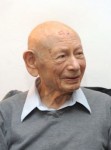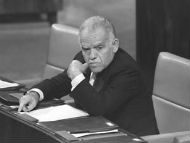 Israeli politician and the seventh Prime Minister of Israel, serving two terms, 1983-84 and 1986-1992. He was the country’s second longest-serving prime minister after David Ben-Gurion.
Israeli politician and the seventh Prime Minister of Israel, serving two terms, 1983-84 and 1986-1992. He was the country’s second longest-serving prime minister after David Ben-Gurion.
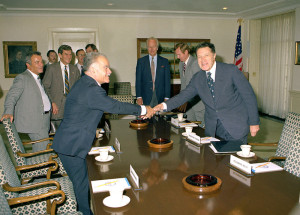
Yitzhak Shamir was born in Ruzinoy, Poland in 1915. He attended the Bialystok Hebrew Secondary School and was an active member of Jabotinsky’s Betar Zionist youth movement. At the age of 20, he interrupted his law studies in Warsaw to move to British Mandatory Palestine, where he enrolled at the Hebrew University in Jerusalem.
Soon after, he joined the Irgun Zvai Leumi (National Military Organization “Etzel”) and, in 1940, followed Avraham Stern into Lohamei Herut Yisrael (Freedom Fighters of Israel “Fighters”). The following year he was imprisoned by the British authorities. In 1943, he escaped from detention camp and became one of the Lehi’s principal leaders.
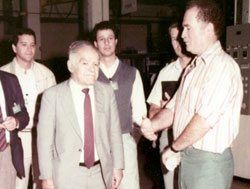
Shamir served as Lehi’s principal director of operations until 1946, when he was detained again by the British and exiled to a Britishrun prison camp in Eritrea. In 1947, he escaped from the camp, made his way to the neighboring French colony of Djibouti, and later granted political asylum in France. Upon his return to Israel, he resumed command of the Lehi until it disbanded in 1949.
After managing several commercial enterprises, Shamir joined Israel’s security services in the mid1950’s. He returned to private commercial activity in the mid1960’s, when he became active in the campaign to free Soviet Jewry and joined Menachem Begin’s Herut movement, which evolved into the Likud Party.
Elected to the Knesset in 1973 as a member of the Likud, Shamir served on the Foreign Affairs and Defense Committee and the State Comptroller’s Committee. Upon reelection to the Knesset in 1977, he became Speaker, in which capacity he presided over the historic visit of Egyptian President Anwar Sadat and the debate over the peace treaty with Egypt.
Following the resignation of Moshe Dayan, Shamir joined the Begin Cabinet as Foreign Minister in March 1980, and continued in this position after the 1981 elections. He guided negotiations on the posttreaty “normalization” process with Egypt, and initiated diplomatic contacts with numerous African countries which had severed relations with Jerusalem during the Yom Kippur War. Following Operation Peace for Galilee in 1982, Shamir directed negotiations with Lebanon which led to the 1983 peace agreement (never ratified by the Lebanese government).
In October 1983, Shamir succeeded Menachem Begin as Prime Minister. Following the 1984 election, he became VicePremier and Foreign Ministry in the Government of National Unity.
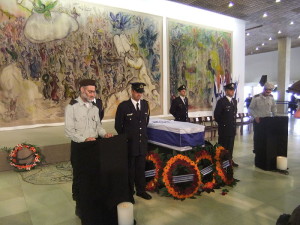
Together with Defense Minister Moshe Arens, Shamir worked with President Ronald Reagan and Defense Secretary Casper Weinberger to create a framework for U.S.Israel strategic cooperation and the U.S.Israel Free Trade Agreement. In midterm, Shamir returned to the premiership, rotating positions with Labor leader Shimon Peres.
Following the 1988 elections, Shamir again created a National Unity Government with Labor, but without the “rotation” element of its predecessor. This government fell in 1990 due to a vote of noconfidence in the Knesset, but, following a protracted stalemate, Shamir succeeded in forming a narrow coalition government.
In May 1991, Shamir ordered the airlift rescue of thousands of Ethiopian Jews, codenamed “Operation Solomon.” In September 1991, he represented Israel at the Madrid Peace Conference which brought about direct negotiations with Syria, Jordan, Lebanon and the Palestinians.
Defeated in the 1992 election, Shamir stepped down from the party leadership and retired from the Knesset in 1996. Shamir died on June 30, 2012, at a nursing home in Tel-Aviv where he had spent the last few years as a result of the Alzheimer’s disease he had suffered since the mid-1990s.



